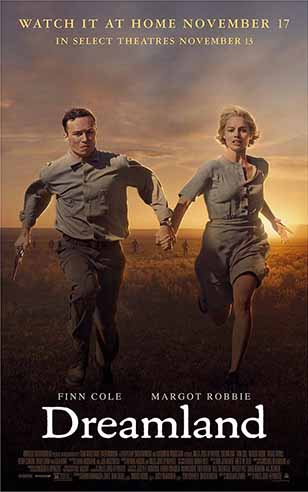 DREAMLAND, US, 2019. Starring Finn Cole, Margot Robbie, Travis Fimmel, Kerry Condon, Darby Camp, Stephen Dinh, voice-over: Lola Kirke. Directed by Miles Joris-Peyrafitte. 98 minutes. Rated MA (Strong themes and violence)
DREAMLAND, US, 2019. Starring Finn Cole, Margot Robbie, Travis Fimmel, Kerry Condon, Darby Camp, Stephen Dinh, voice-over: Lola Kirke. Directed by Miles Joris-Peyrafitte. 98 minutes. Rated MA (Strong themes and violence)
In the US in the 1930s, during the aftermath of the Wall Street financial collapse and the pervasive Depression, a dreamland would have been in the imaginations of many Americans. That is the setting for this drama. The particular setting is in the Dakotas, certainly a depressed area, dry and barren, subject to tornadoes (and one of the biggest we are likely to see on screen). Settlers were invited to go out to cultivate the land but found only the dry. They built, set up towns, struggled for survival, the next generation dreaming of getting out of there, of what could be.
A lot of this information is conveyed to us by a voice-over, the adult voice of the little girl, Phoebe (Darby Camp) recalling these events 20 years later. And, she says, she is perpetuating the story, the legend of her older stepbrother, Eugene.
At the time of the action, Eugene is a young adult, at home with his mother and sister and his stepfather, who works with the local police. Eugene has a friend Joe, who looks Native American, but who is soon to move away from the Dakotas for a better life in California. Eugene really has nothing much to look forward to – but has this long desire to find the father who walked out on them when he was little, failed in his work, a drinker, gone to Mexico where he has discovered religion, sending one postcard to Eugene and not heard of again.
But, that is not this story. This is a story about bank robbers in 1935, the era of that Americans will remember and moviegoers will know as the era of Bonnie and Clyde. In fact, this story becomes a variation on Bonnie and Clyde.
This time the Bonnie character is called Alison. And she is played by Margot Robbie. Her reputation has gone before her, robbing banks, shootouts, innocent bystanders killed including a little girl. She is on the run, a $10,000 bounty on her head, something which activates Eugene’s father as well as the local authorities. They are searching for Alison.
In fact, Alison has taken refuge in the outback barn on Eugene’s family property. Alison has a plausible explanation of what has happened to her, she can sweet talk Eugene. She is wounded. He is able to remove the bullet from her leg, bandage her, keep quiet about her presence, bring her food, take her for a swim in the local dam. He has never met anyone like Alison before. No surprise that he becomes infatuated. Eugene is prepared to do anything for Alison – and he does.
As we expect, Alison and Eugene will go on the run, pursued by his father, Phoebe sneaking away in the car.
But, key to the characters of Alison and Eugene, there is quite a telling sequence where the couple stay the night in a hotel, Alison going into the shower, the camera not filming her but focusing on Eugene outside the shower as she challenges him, telling him that he has to make personal decisions, take responsibility, whether he will go into the shower or not. The sequence is reticent but effective.
While there have been flashbacks to the original bank robbery that Alison was involved in, the revelation that she had partner, a franker showing of the truth, there is a visual reminder at the end of what the bank robberies were really like, whatever the intentions of the robbers.
In many ways, this is a modest film, a small focus on the Depression and ordinary people who became outlaws.
(Interesting that two of the central roles are played by Australians, Margot Robbie and Travis Fimmel)
Paramount
Released 17 December
Peter Malone MSC is an associate Jesuit Media